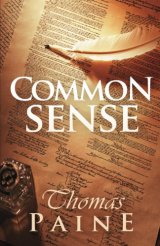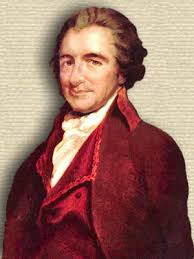Common Sense Page #13
Common Sense is a pamphlet written by Thomas Paine in 1775–1776 advocating independence from Great Britain to people in the Thirteen Colonies. Writing in clear and persuasive prose, Paine marshaled moral and political arguments to encourage common people in the Colonies to fight for egalitarian government.
Youth is the seed time of good habits, as well in nations as in individuals. It might be difficult, if not impossible, to form the Continent into one government half a century hence. The vast variety of interests, occasioned by an increase of trade and population, would create confusion. Colony would be against colony. Each being able might scorn each other's assistance: and while the proud and foolish gloried in their little distinctions, the wise would lament, that the union had not been formed before. Wherefore, the present time is the true time for establishing it. The intimacy which is contracted in infancy, and the friendship which is formed in misfortune, are, of all others, the most lasting and unalterable. Our present union is marked with both these characters: we are young and we have been distressed; but our concord hath withstood our troubles, and fixes a memorable area for posterity to glory in. The present time, likewise, is that peculiar time, which never happens to a nation but once, viz. the time of forming itself into a government. Most nations have let slip the opportunity, and by that means have been compelled to receive laws from their conquerors, instead of making laws for themselves. First, they had a king, and then a form of government; whereas, the articles or charter of government, should be formed first, and men delegated to execute them afterward: but from the errors of other nations, let us learn wisdom, and lay hold of the present opportunity--To begin government at the right end. When William the Conqueror subdued England, he gave them law at the point of the sword; and until we consent, that the seat of government, in America, be legally and authoritatively occupied, we shall be in danger of having it filled by some fortunate ruffian, who may treat us in the same manner, and then, where will be our freedom? where our property? As to religion, I hold it to be the indispensable duty of all government, to protect all conscientious professors thereof, and I know of no other business which government hath to do therewith. Let a man throw aside that narrowness of soul, that selfishness of principle, which the niggards of all professions are so unwilling to part with, and he will be at once delivered of his fears on that head. Suspicion is the companion of mean souls, and the bane of all good society. For myself, I fully and conscientiously believe, that it is the will of the Almighty, that there should be diversity of religious opinions among us: It affords a larger field for our Christian kindness. Were we all of one way of thinking, our religious dispositions would want matter for probation; and on this liberal principle, I look on the various denominations among us, to be like children of the same family, differing only, in what is called, their Christian names. In page forty, I threw out a few thoughts on the propriety of a Continental Charter, (for I only presume to offer hints, not plans) and in this place, I take the liberty of re-mentioning the subject, by observing, that a charter is to be understood as a bond of solemn obligation, which the whole enters into, to support the right of every separate part, whether of religion, personal freedom, or property. A firm bargain and a right reckoning make long friends. In a former page I likewise mentioned the necessity of a large and equal representation; and there is no political matter which more deserves our attention. A small number of electors, or a small number of representatives, are equally dangerous. But if the number of the representatives be not only small, but unequal, the danger is increased. As an instance of this, I mention the following; when the Associators petition was before the House of Assembly of Pennsylvania; twenty-eight members only were present, all the Bucks county members, being eight, voted against it, and had seven of the Chester members done the same, this whole province had been governed by two counties only, and this danger it is always exposed to. The unwarrantable stretch likewise, which that house made in their last sitting, to gain an undue authority over the delegates of that province, ought to warn the people at large, how they trust power out of their own hands. A set of instructions for the Delegates were put together, which in point of sense and business would have dishonoured a schoolboy, and after being approved by a few, a very few without doors, were carried into the House, and there passed in behalf of the whole colony; whereas, did the whole colony know, with what ill-will that House hath entered on some necessary public measures, they would not hesitate a moment to think them unworthy of such a trust. Immediate necessity makes many things convenient, which if continued would grow into oppressions. Expedience and right are different things. When the calamities of America required a consultation, there was no method so ready, or at that time so proper, as to appoint persons from the several Houses of Assembly for that purpose; and the wisdom with which they have proceeded hath preserved this continent from ruin. But as it is more than probable that we shall never be without a Congress, every well wisher to good order, must own, that the mode for choosing members of that body, deserves consideration. And I put it as a question to those, who make a study of mankind, whether representation and election is not too great a power for one and the same body of men to possess? When we are planning for posterity, we ought to remember, that virtue is not hereditary. It is from our enemies that we often gain excellent maxims, and are frequently surprised into reason by their mistakes. Mr. Cornwall (one of the Lords of the Treasury) treated the petition of the New- York Assembly with contempt, because that House, he said, consisted but of twenty-six members, which trifling number, he argued, could not with decency be put for the whole. We thank him for his involuntary honesty. ¹ ¹ Those who would fully understand of what great consequence a large and equal representation is to a state, should read Burgh's political disquisitions. To Conclude, however strange it may appear to some, or however unwilling they may be to think so, matters not, but many strong and striking reasons may be given, to shew, that nothing can settle our affairs so expeditiously as an open and determined declaration for independance. Some of which are,
Translation
Translate and read this book in other languages:
Select another language:
- - Select -
- 简体中文 (Chinese - Simplified)
- 繁體中文 (Chinese - Traditional)
- Español (Spanish)
- Esperanto (Esperanto)
- 日本語 (Japanese)
- Português (Portuguese)
- Deutsch (German)
- العربية (Arabic)
- Français (French)
- Русский (Russian)
- ಕನ್ನಡ (Kannada)
- 한국어 (Korean)
- עברית (Hebrew)
- Gaeilge (Irish)
- Українська (Ukrainian)
- اردو (Urdu)
- Magyar (Hungarian)
- मानक हिन्दी (Hindi)
- Indonesia (Indonesian)
- Italiano (Italian)
- தமிழ் (Tamil)
- Türkçe (Turkish)
- తెలుగు (Telugu)
- ภาษาไทย (Thai)
- Tiếng Việt (Vietnamese)
- Čeština (Czech)
- Polski (Polish)
- Bahasa Indonesia (Indonesian)
- Românește (Romanian)
- Nederlands (Dutch)
- Ελληνικά (Greek)
- Latinum (Latin)
- Svenska (Swedish)
- Dansk (Danish)
- Suomi (Finnish)
- فارسی (Persian)
- ייִדיש (Yiddish)
- հայերեն (Armenian)
- Norsk (Norwegian)
- English (English)
Citation
Use the citation below to add this book to your bibliography:
Style:MLAChicagoAPA
"Common Sense Books." Literature.com. STANDS4 LLC, 2024. Web. 25 Nov. 2024. <https://www.literature.com/book/common_sense_270>.




Discuss this Common Sense book with the community:
Report Comment
We're doing our best to make sure our content is useful, accurate and safe.
If by any chance you spot an inappropriate comment while navigating through our website please use this form to let us know, and we'll take care of it shortly.
Attachment
You need to be logged in to favorite.
Log In